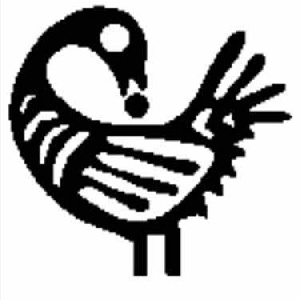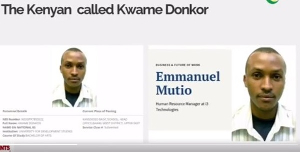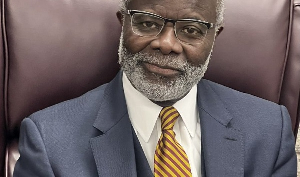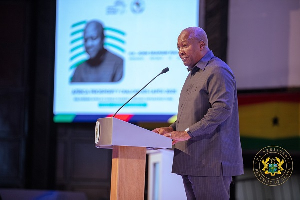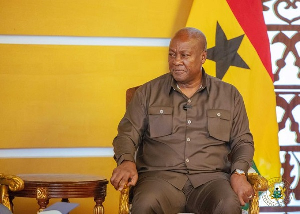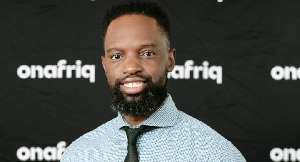: The case of Kwame Pianim, Harold Amonoo Kwofie and Agyeman Badu Akorsah.
Although we all love the land of our birth, and/or our parents’ land of birth, which many of us still regard as our motherland, and thus it becomes part of our common cause and shared sense of patriotism.
Many of our kinsmen at home and in Diaspora applaud that love and promote it. The lyrics of our official national anthem “God Bless Our Homeland Ghana, And make our nation great and strong” and the unofficial national anthem in one of our native languages, “Hen Ara Hen Asasi Ni” (This is our land) unite us to our flag, country and God.
The love of our motherland, Ghana, has been a fine tradition among our compatriots. This has help to bring about the great transformation we are witnessing today, a combination of partnership working between the diaspora and those at home, between all stakeholders, between Hometown Associations and Professional Associations and the skilled and unskilled. The Ghanaian ethos (which is non tribal) of return to the motherland is associated with a strong cultural focus on emotional ties with the motherland (Efie ni fie – home is home). Ghanaians have been very explicit about the obligation to return home, which to them is paramount, a notion that migration scholars, including this writer, find perplexing and astonishing, especially among all the three migrant groups, Classic (those who wished to return to retire through homesickness), moderate (those who felt changing local and global economic conditions would enable them to form new enterprises in the homeland) and empty-handed returnees. Ghanaians consider returning home as unquestionable right and uncontested duty to the motherland, regardless of professional status, especially with the recent announcement of discovery of large deposits of oil in their homeland.
During the 1990s and early 2000s, among the intelligentsia in the Ghanaian political discourse, the themes of good housekeeping and good health of the nation often went hand in hand. Good economic management became the catchphrase for pursuing progressive reforms aimed at restoring what was seen as Ghana’s pride and glory.
The transformation of our motherland can also be attributed to the willingness of ex President Rawlings handing over power to President Kuffuor, and to the good management of the economy by the two presidents, despite the hard economic situation that we witnessed within our sub region over the past two decades.
Some of us remember the era of the 1980s; often refer to as the “lost decade”, when the word Ghana became a derogatory word in the West. Citizens lost their lives by fleeing from persecution from neighbouring countries because they happen to be Ghanaians. That was over 28 years ago! A very sad period in our nation’s history. The love of country and God save our motherland from disintegrating! Most of the problems that led to this “unfortunate” episode in our country’s history have all but forgotten. Today there is stability and peace in our homeland, though some of our people still live in demeaning and dehumanising poverty, we have got our dignity back as a nation.
In the next few months, we shall be going to the polls to elect our parliamentarians and a president for the next four years. We hope and pray that our homeland is not turned into a battle zone over political means, as was the case elsewhere on the continent.
The Vision of the rich and the poor in Ghana are the same. 1) That vision is peace and unity must reign in every district, town and hamlet of our homeland. In spite of their different profession, do stand firm on one Ghana, one people, one destiny! And Love for God and Country! 2) Along with AIDs and opportunistic diseases such as malaria and TB, poverty is one area that Kwame Pianim and Amonoo Kwofie agree we must fight to eradicate in our homeland.
The question that needs to be asked is, “Does Ghana needs a new third way?” In United Kingdom, the “Third Way of Tony Blair’s government “1997 to 2007” produced the highest income growth among the poorest ever seen in the Western World since world war 2. The poor in Ghana did have the same faith in the NPP government when they were elected in 2000. In 2008, many of the poor are still waiting! But it is irresponsible to hammer the Kuffuor led NPP government for trying, with some “success”, to assist the poor. The essence now is to find a new way of poverty eradication and job creation. The fact that some of the policies pursued by NPP in the first 4 years have helped to transform the economy is undeniable.
There are many others who despite their glazing and shining careers in Diaspora chose to go home and help in the development of Ghana. These sons and daughters of the homeland carries the flag in reflecting our unity. These include Kwame Pianim and Harold Amonoo Kwofie among others. These patriotic citizens sacrifice themselves and means of livelihood to answer the call of duty in the motherland.
In the area of finance, Kwame Pianim has used his vast knowledge and contacts in international finance to open new areas of development in the finance sector, thus opening up opportunities in international finance to many brilliant finance graduates. In the area of medicine, Harold Amonoo Kwofie, one of the world best eminent physicians and a son of the homeland, not only talked the talk, but followed his conviction and help establish a very successful school of Medical Science at University of Cape Coast.
In the area of sanitation and disease control, Agyeman Badu Akorsah’s role as the head of the Health Service cannot be discounted. The prevalence of epidemics during the 1980s and 1990s during Akorsah’s watch as health boss correlated with the low level of public hygiene in Ghana. These conditions impelled Akorsah to expound on the idea of cleanliness and hygiene in his work. His interest in clean and healthy society led him to promote hygiene spurred discussion of and innovation in modes of public sanitation across the country. Akorsah urged newspapers to drum the theme of hygiene in their pages as a societal necessity and thus help improve public sanitation.
The love of the motherland can be seen in all those in business, politics, industry and in academia. Kwame Nkrumah devoted his whole life to the unity of ethnic groups and development of the country. Until his death, Kwame Nkrumah practised what he advocated.
With the discovery of oil, the major task that is facing the incoming government is to increase spending on social development, physical infrastructure and encourage private/public partnership working in job creation. Spending on welfare and social security for the vulnerable, including the old, children and the disable will increase, it is imperative that we do not turn our back them. There has been little public debate on the challenge of service provision for the vulnerable group during this presidential debate. The debate rather has centred on the challenge of growing the economy and creating job opportunities for the jobless. For the incoming government to tackle unemployment and the problem jobless worth poses for the country, it is important they understand the shifts that have taken place in the Ghanaian economy and the challenges these pose in any future poverty reduction policy.
With regards to Kuffuor government, despite allegations of corruption among some of his ministers, the President, through intelligent policies and determined effort has managed to turn the economy round. His government halted the downward spiral of the NDC years which the economy hit the buffers and placed the country on sound economic footing. The fact that President Kuffuor’s government has made impressive gains towards meeting the many challenges facing our country will be his lasting legacy! The question to ask is which of the 3 presidential candidates (Kofi Atta Mills, Papa Kwesi Nduom and Nana Akuffo Addo) can take the country to the “cherish dream” of middle income status.
The liberalized business haven and zero tax on reinvested corporate income have helped bring some jobs to Ghana, but the next step is finding a way for its jobs opportunities to become the best in the sub region. “In every need, whatever the call may be, to serve thee, Ghana, now and evermore” Without compatriots like Kwame Painim, Amonoo Kwofie and Agyeman Badu Akorsah and countless others who left all the riches behind to answer the call of duty home, that dream of hope and glory for many Ghanaians will become an illusion!
In conclusion, this writer would like to thank Prof Harold Amonoo Kwofie, the dean of School of Medicine, University of Cape Coast, Prof Agyeman Badu Akorsah, a physician and leading politician and Mr Kwame Pianim, an eminent economist, for using their vast skills in medicine and finance respectively by joining forces with their counterparts in Ghana to reform medicine and finance for the betterment of all Ghanaians and the generation after them.
Peter Jeffrey London.
peter.jeffrey@yahoo.com
Opinions of Thursday, 11 September 2008
Columnist: Jeffrey, Peter





